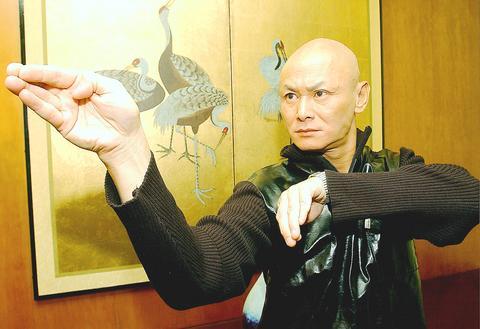Gordon Liu (
Taipei Times: How did Quentin Tarantino talk to you into making the movies?
Liu: When I was told about Quentin's interest in working with me, I told his producer "tell him that I don't know him." When we met in Shanghai, I wore a Chinese suit in order to be formal. I did not expect him to appear in a Chinese suit also! And the first word he greeted me with was shi-fu! (

PHOTO: TAIPEI TIMES
TT: Why are there two roles? Was it yours or Tarantino's idea to have Pai Mei fondling his beard a lot?
Liu: Originally, my role was just Johnny Mo and Quentin wanted to play Pai Mei himself because he is so obsessed with such a vintage character. But when he was in make-up and asked my opinion, I told him, "You look like a Santa Claus, not a martial-arts master." He didn't play the role, instead he did Pai Mei's voice for the US and European version of the movie. It was my idea to make the comic gesture of Pai Mei stroking his beard. It was a different character compared with Johnny Mo. Being Mo the emphasis was on the actions and your expression had to be fierce. But Pai Mei is a role with more humor, he is a softer character (though he is strict with Uma Thurman's character), so the gesture was natural for me.
TT: What was it like to act in the fighting scenes with Uma Thurman?
Liu: If I were her, I would not have taken the two movies. She was punched a lot and slammed against the ground so many times in the movie. During the shooting, in Beijing, she had just given birth to a baby. For me, I've practiced martial arts for decades. But she was trained only for a few months and flew all the way to Beijing to shoot the fighting scenes. Actually, in the beginning, she only fought me in the air, maybe out of respect, until I said to her "Come on, hit me!" After that she had a killer's eyes when she fought with me.
TT: Was that real kung fu in the movie? The Eagle Foot style (
Liu: Of course. The scene when Thurman and I are practicing kung fu together in a cartoon format was the real Tiger-Crane style. It is one of the most famous kung fu styles of my martial arts clan, the Hung Gar style kung fu (洪拳). Quentin is such a fan of the Tiger-Crane style and he wanted me to display it once again on the big screen. As for the Eagle-Feet style, this was a style that contrasted well with the Tiger-Crane style. Actually both these two styles do not belong to Shaolin, or the legendary Pai Mei in history books. Quentin just did mix-and-match for the fun of it.
TT: Being a martial artist, a stuntman and an action actor for decades, how different is real kung fu from what we see in the movies?
Liu: For me, in a movie, you need not just the real kung fu to make believe, but you also have to be able to deliver the plot through the actions. That is the hard part. For a movie you have to express physical beauty in the fighting choreography, and also in your facial expressions. You have to fit in with the atmosphere and take on the personality of a role in relation to an opponent. I remember the most difficult scene in Kill Bill was a fight with Uma Thurman standing on the verge of a banister. I have to make several spins in attacking, while at the same time making my gestures beautiful and convey a killer's spirit toward Thurman. At the same time I had to be careful not to fall from the two-story building!
TT: How did it feel to work in a Hollywood movie?
Liu: It was luxurious, very comfortable. The division of labor is very clear and well-organized. You take enough breaks after a working day. It was much less hectic than in Hong Kong. I'm very honored, as a Chinese actor, to have played a role in both movies and I have to be thankful to Quentin, who has brought my clan's martial arts to the world.
TT: Have you been practicing kung-fu regularly, outside of the movies?
Liu: Yes, every day. I practice kung fu for my health. I can do without making movies but not without kung fu.
TT: What is your next project?
Liu: I am doing a martial-arts TV drama, about my great grand master Wong Fei-hong (黃飛鴻), and another period drama after that. Both will be shot in China.

Not long into Mistress Dispeller, a quietly jaw-dropping new documentary from director Elizabeth Lo, the film’s eponymous character lays out her thesis for ridding marriages of troublesome extra lovers. “When someone becomes a mistress,” she says, “it’s because they feel they don’t deserve complete love. She’s the one who needs our help the most.” Wang Zhenxi, a mistress dispeller based in north-central China’s Henan province, is one of a growing number of self-styled professionals who earn a living by intervening in people’s marriages — to “dispel” them of intruders. “I was looking for a love story set in China,” says Lo,

It was on his honeymoon in Kuala Lumpur, looking out of his hotel window at the silvery points of the world’s tallest twin skyscrapers, that Frank decided it was time to become taller. He had recently confessed to his new wife how much his height had bothered him since he was a teenager. As a man dedicated to self-improvement, Frank wanted to take action. He picked up the phone, called a clinic in Turkey that specializes in leg lengthening surgery — and made a booking. “I had a lot of second thoughts — at the end of the day, someone’s going

In the next few months tough decisions will need to be made by the Taiwan People’s Party (TPP) and their pan-blue allies in the Chinese Nationalist Party (KMT). It will reveal just how real their alliance is with actual power at stake. Party founder Ko Wen-je (柯文哲) faced these tough questions, which we explored in part one of this series, “Ko Wen-je, the KMT’s prickly ally,” (Aug. 16, page 12). Ko was open to cooperation, but on his terms. He openly fretted about being “swallowed up” by the KMT, and was keenly aware of the experience of the People’s First Party

Standing on top of a small mountain, Kim Seung-ho gazes out over an expanse of paddy fields glowing in their autumn gold, the ripening grains swaying gently in the wind. In the distance, North Korea stretches beyond the horizon. “It’s so peaceful,” says the director of the DMZ Ecology Research Institute. “Over there, it used to be an artillery range, but since they stopped firing, the nature has become so beautiful.” The land before him is the demilitarized zone, or DMZ, a strip of land that runs across the Korean peninsula, dividing North and South Korea roughly along the 38th parallel north. This